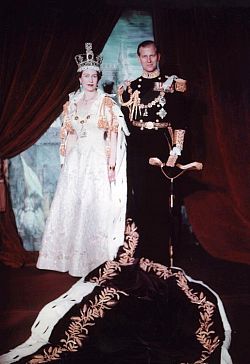Sussex historian looks back at the Queen’s coronation for TV documentary
A BBC TV documentary commemorating the Queen’s coronation of 1953 features Sussex historian Dr Claire Langhamer talking about how the Mass Observation Archive (MOA) captured the nation’s feelings about the event.
 Queen Elizabeth II at her coronation, with Prince Philip.
Queen Elizabeth II at her coronation, with Prince Philip.
‘The People’s Coronation’, which is on BBC One at 9pm on Monday (3 June), includes archive film footage and interviews with those who have stories to tell about the event, as well as a look at some of the fascinating diaries and ephemera in the MOA.
Dr Langhamer, who was filmed in the Library with the programme’s presenter David Dimbleby, says: “For me, the most interesting aspect of the 1953 coronation is the feelings of ordinary British people about it. The Mass Observation Archive at Sussex helps us to get at these and that’s what David Dimbleby came to look at.
“Mass Observation was intensely interested in the event itself.
“For example, it asked its panel of volunteer writers what the meaning and purpose of the coronation was for them, it stopped people in the street to solicit their views on street and shop decorations, and it encouraged people to keep a coronation-day diary.
“It collected a range of everyday commemorative items such as an OXO paper crown and, my favourite, a Smith’s coronation crisp packet.
“The archive also contains essays written by children at the time that reveal a mixture of excitement, frustration and critique.
“While one 15 year-old-girl was looking forward to the ‘potato crisps and margarine’ she had been promised on the day, another believed the whole event to be a waste of public money: ‘Instead of his disgraceful public expenditure the old age pensioners could be given a ‘Coronation Bonus’,’ she suggested.
“There were mixed feelings throughout – some took real pleasure in the event while others were vehemently opposed. Others again simply looked forward to a bit of a holiday.
“Perhaps the most interesting thing that emerges from the evidence is its complexity – it is certainly difficult to generalise about ‘national feeling’ or collective public response.”

